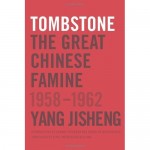Courtesy of one of the students in my development seminar, here are links to a two-part NPR story about China’s famine of 1958-1962: part 1 and part 2.
Between 1958 and 1962, an estimated 20 to 43 people died of hunger in China, which China’s official statistics claiming 15 million deaths and the highest estimates reporting a death toll of 45 million. For comparison, the death toll from World War 1 is estimated to be about 17 million. During the Chinese famine, people eventually survived on anything they could find, eventually going so far as to eat their dead and their own children.
The NPR story discusses Tombstone, a book which just came out in English and which took Chinese reporter Yang Jisheng 10 years of working in secrecy to write. I’m about 100 pages into the book. It is a fascinating and monumental account of China’s Great Famine. And as one might reasonably expect, it is banned in China.
